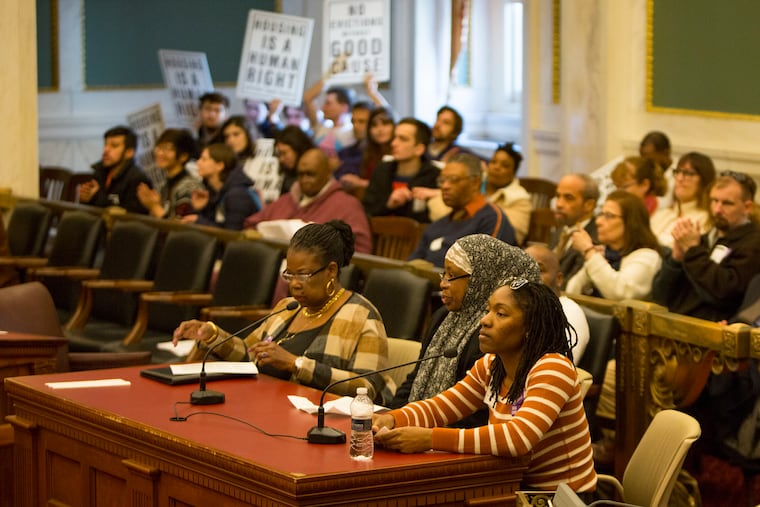Watered-down 'good cause’ eviction bill now Philly law
The bill, which protects tenants on short-term leases from eviction without good cause, goes into effect April 22.

A bill signed into law Tuesday will offer some protections to month-to-month renters in Philadelphia from discriminatory or vindictive evictions.
The bill, which City Council passed in early December, amends the Fair Housing Ordinance to require landlords to have a good reason for evicting someone with a lease lasting less than one year.
As originally proposed, the bill covered all leases, but building owners and landlord associations said that put unfair burdens on landlords that could dissuade them from renting, and infringed on their ability to run their business.
“Any law that says a landlord has to have a good reason for evicting somebody is a major step forward,” said Phil Lord, managing attorney for the Tenant Union Rights Network (TURN). “Now they have to disclose, and if it’s a bad reason, like discrimination, then they have to come up with a lie, and if they’re not good at that, they won’t try.”
The bill came out of an eviction crisis in Philadelphia, where one in 14 renters had eviction notices filed against them in 2017. Councilman Curtis Jones Jr. also saw it as a guard against displacement in neighborhoods where living costs are rising, and landlords may want to renovate properties and raise rent. As passed, the bill does little to protect against that, though. Among the permitted causes for evicting someone is if the landlord intends to make repairs on a unit or raise the rent.
Other “good causes” include nonpayment of rent, breach of the lease, damage to property, nuisance behavior, refusal to allow the landlord to make repairs, or to sign a revised lease. A landlord can also evict someone if the intent is to rent the unit to an immediate family member.
To terminate for good cause, a landlord must give the tenant 30 days' notice or the lease will automatically renew for another month.
It’s meant to protect people from being evicted for complaining about needed repairs or reporting a landlord to the city, as often happens, said Rue Landau, executive director of the Fair Housing Commission. The bill could also expose instances when a landlord tries to evict someone for reasons that violate Fair Housing laws.
“There are far too many low-income people in Philadelphia living in rental units in need of significant repairs,” Landau said. “This Good Cause bill strengthens the Fair Housing Ordinance and will keep unscrupulous landlords from committing unfair rental practices and terminating leases simply because tenants request necessary repairs."
Karla Cruel, an attorney who represents tenants in landlord-tenant court and who previously worked for TURN, had advocated for the bill in the past but said she doesn’t see the one that was enacted as being effective.
“To be very frank, I never thought it was going to do much," Cruel said. "It doesn’t really do anything without any type of rent control attached to it. You can always just raise the rent beyond what someone can pay and that’s good cause in the bill.”
Cruel – who is running for City Council – said another issue with the landlord-tenant legal system is the short window a tenant often has to file a complaint with the Fair Housing Commission to argue that an eviction was without good reason. Once a landlord files an eviction complaint in Municipal Court, a tenant can no longer submit a complaint to the commission, Cruel said. “We tell tenants, run and get to Fair Housing before your landlord can sue you in court because if the landlord sues, you can’t go.”
Victor Pinckney, president of HAPCO, the landlords association, said the law will make it harder for landlords to evict problem tenants whose behavior affects the quality of life of good tenants.
“Say you’ve got a tenant who doesn’t put the trash out, has visitors coming in at all hours of night, making noise, upsetting neighbors; you just give them 30 days' notice and call it a day,” Pinckney said. “Now, they have the option to go to the Fair Housing Commission, you get called to testify, meanwhile the good tenants are unhappy and might move out. If I have good tenants, I want to keep my good tenants happy."
The bill will go into effect April 22.